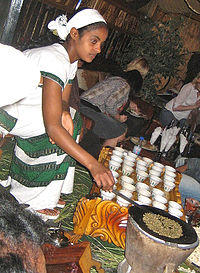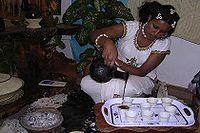
A coffee ceremony is a ritualized form of making and drinking coffee. The coffee ceremony was first practiced by the southwestern Ethiopian people. There is a routine of serving coffee daily, mainly for the purpose of getting together with relatives, neighbors, or other visitors. If coffee is politely declined, then tea will most likely be served.
Loose grass is spread on the floor where the coffee ceremony is held, often decorated with small yellow flowers. Composite flowers are sometimes used, especially around the celebration of Meskel (an Orthodox Holiday celebrated by Ethiopians).
Brewing
The ceremony is typically performed by the woman of the household and is considered an honor.[1] The coffee is brewed by first roasting the green coffee beans over an open flame in a pan.[2][3] This is followed by the grinding of the beans, traditionally in a wooden mortar and pestle.[3] The coffee grounds are then put into a special vessel which contain boiled water and will be left on an open flame a couple of minutes until it is well mixed with the hot water.[2] After grinding, the coffee is put through a sieve several times.[3] The boiling pot (jebena) is usually made of pottery and has a spherical base, a neck and pouring spout, and a handle where the neck connects with the base.[3] The jebena also has a straw lid.[3]
Serving

The host pours the coffee for all participants by moving the tilted boiling pot over a tray with small, handleless cups from a height of one foot without stop until each cup is full.[3] The grounds are brewed three times: the first round of coffee is called awel in Tigrinya, the second kale'i and the third baraka ('to be blessed'). In Amharic it's አቦል abol, the second ቶና tona and the third በረካ baraka .[4] The coffee ceremony may also include burning of various traditional incense.[4] People add sugar to their coffee, or in the countryside, sometimes salt or traditional butter (see niter kibbeh).[3] The beverage is accompanied by a small snack such as popcorn, peanuts or himbasha (also called ambasha).[3]
See also
References
- ^ "Coffee Traditions: Ethiopian Coffee Ceremony". Archived from the original on 2016-11-13.
- ^ a b Tavitian, Maral (January 5, 2016). "Experience a True Ethiopian Coffee Ceremony in L.A.'s Little Ethiopia". LA Weekly. Archived from the original on November 12, 2016. Retrieved November 11, 2016.
- ^ a b c d e f g h Doyle, Emily. "Ethiopian Coffee Ceremony". Epicurian.com. Archived from the original on 2009-10-03.
- ^ a b Farley, David (April 8, 2013). "Coffeland". Afar. Archived from the original on November 13, 2016.
External links
- [1], Ethiopian Coffee Ceremony Video run by ethiopiancoffeeceremony.com [2]
- Ethiopian Coffee Ceremony in photos at Canadian Photographer series on the Ethiopian Coffee Ceremony
- What is the Coffee Ceremony, a multimedia primer on the Coffee Ceremony run by Bunna Cafe
